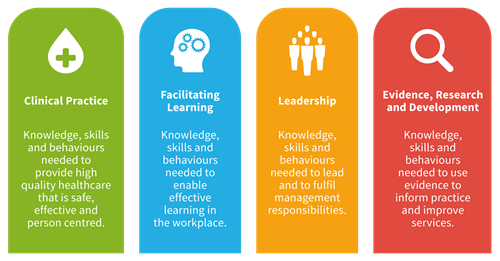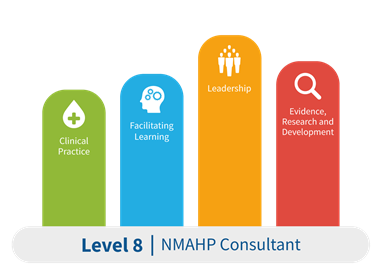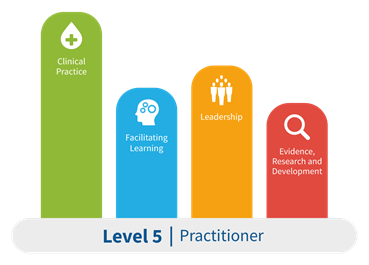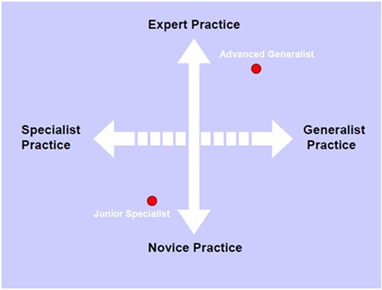Four pillars of practice
The NMAHP Development Framework builds on existing NMAHP initiatives that use four Pillars of Practice.
- Clinical Practice: the knowledge, skills and behaviours needed to provide high quality healthcare that is safe, effective and person centred
- Facilitating Learning: the knowledge, skills and behaviours needed to enable effective learning in the workplace
- Leadership: the knowledge, skills and behaviours needed to lead and to fulfil management responsibilities
- Evidence, Research and Development: the knowledge, skills and behaviours needed to use evidence to inform practice and improve services

The knowledge, skills and behaviours described in the Facilitating Learning, Leadership and Evidence, Research and Development pillars are common to all NMAHP professions and specialities. The Clinical pillar also contains core content that can be expanded and contextualised for different roles.
The emphasis on each pillar may vary according to the level of practice and the specific role. For example, the emphasis may be on the ‘Clinical Practice’ pillar for a practitioner at Level 5 whereas at level 8, the ‘Leadership’ pillar may predominate (Figure 3). A practitioner in a specific role, such as a Practice Educator, will give more emphasis to developing the knowledge, skills and behaviours associated with the ‘Facilitation of Learning’ pillar than a practitioner at the same level working in a clinical role. Depending on the individual’s role, they may not demonstrate all knowledge, skills and behaviours all of the time, but they should have the capability to do so at their level of practice and all those in the preceding level of practice.
Figure 3


The Development Framework works in conjunction with specialist frameworks. It provides core content, that can be used as the basis from which to add role-specific knowledge, skills and behaviours and the detail associated with a specialism. For example, a practitioner working in a mental health clinical environment may add clinical elements from a specialist mental health framework.
Specialist and Advanced Practice
Whilst Advanced Practice is regarded as a level on the developmental continuum from ‘novice’ to ‘expert’. Specialist practice can be considered as one pole of a different ‘specialist-generalist’ continuum. This approach defines 'specialist' practice as that which is particular to a specific context, be it a client group, a skill set or an organisational context. It is therefore possible to be an advanced specialist or an advanced generalist (Figure 2a). The difference between a specialist and a generalist is depth and breadth of knowledge (Figure 2b).
Figure 2a: The relationship of the novice to expert continuum with specialist and generalist practice.

Figure 2b: The difference in depth and breadth of knowledge between generalists and specialists

